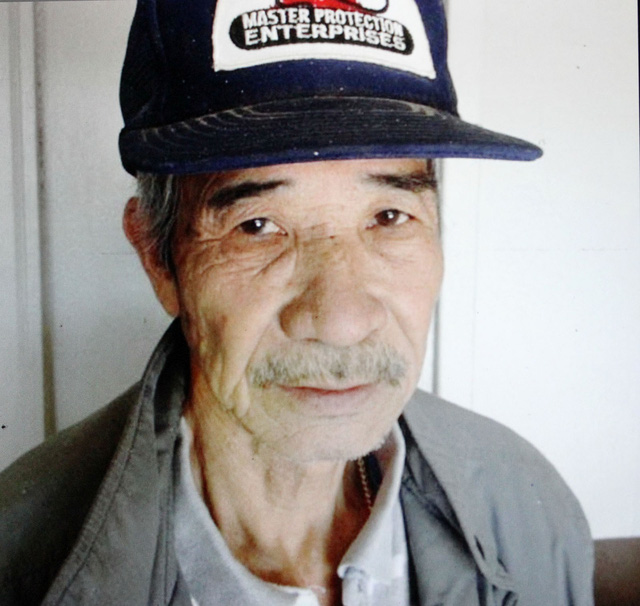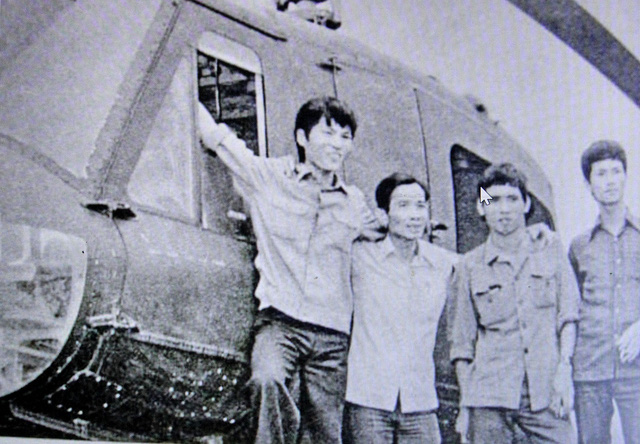One of the conspirators was given the death sentence while others received 20-35 year jail terms.
>> Skyjacking in Vietnam: P5 – Hijacking military planes in broad daylight
>> Skyjacking in Vietnam: P4 – Downing four hijackers
>> Skyjacking in Vietnam: P3 – Tracking down perpetrators of 1978 DC4 hijack
>> Skyjacking in Vietnam: P2 – 52-minute life-and-death ordeal
>> Skyjacking in Vietnam: P1 – First hijackers
While Mig fighter jets scoured Vietnam’s airspace in search of UH1 chopper number 576, Second Lieutenant Kieu Thanh Luc was landing the stolen helicopter in China.
Luc was serving Regiment 917 when he was given a flight ban for violating military regulations. The resentment triggered by the ban eventually led the disgraced pilot to hijack a chopper at Bach Mai Airport in Hanoi on September 30, 1981.
According to Duong Van Loi, an aviation officer under the former Saigon regime and part the ten member crew Luc assembled to escape the country on the stolen chopper, the group’s intention was to land in Hong Kong but instead a curious twist of fate had them landing in Guangxi China.
Fleeing China
“The relationship between Vietnam and China was not particularly peaceful at the time. Beijing intended to take advantage of the incident to propagandize against Hanoi,” Loi recounted in an interview conducted abroad.
“We were originally escorted to Beijing where we were treated like honored guests.”
The hero’s welcome became lukewarm as soon as Chinese officials realized his group wasn’t planning to seek political asylum in China and instead wished to meet representatives of the United Nations (U.N.) in Beijing to petition for political refuge in another country.
Loi stayed in Beijing for over six months before the U.S. responded to the group’s plea for asylum.
“After I filed another petition, the U.S. sent a representative to tell us that they were willing to accept the 10 of us, but China would not let us go,” he added.
Two and a half years later, Loi and his family were taken from Beijing to Liuzhou, a prefecture-level city in north-central Guangxi Zhuang Autonomous Region, with a warning that they would be sent to a refugee camp if they refused to stay in China.
In Liuzhou, Loi met a community of Vietnamese nationals who had fled Hanoi and the northern city of Hai Phong for Hong Kong but were forced to stay in mainland china.
“I was so set on leaving mainland China that I bought a used boat from the Vietnamese I met in Liuzhou,” he shared.
In 1983, after spending nearly three years in Liuzhou, Loi and his family decided to make their escape from China.
“It was a turbulent sea voyage. The old boat was violently rocked by the sea and the engine became inoperable,” Loi said.
The family attempted to wave down a total of 40 passing boats, all of which ignored the small vessel, before a ship waving a Soviet Union flag allowed two of its mechanics to help Loi fix the boat engine.
The family then made its way to Dalupiri, an island in the Babuyan Islands archipelago in the Luzon Strait north of Luzon Island in the Philippines.
From there, they were then taken to Manila were they were put in a refugee camp.
In 1985, Loi and his family were granted permission to settle in France.
A trial hearing for the original ten-member crew involved in the hijacking was held in absentia. Death sentences were handed down to five members of the group, including Luc, Loi, co-pilots Duong Van Bau and Le Ngoc Son, and flight engineer Hoang Xuan Doan.
A few years after Loi and his family moved to France, Bau, Loi’s younger brother, also absconded from Beijing by sea and sought refuge in Japan.
Flight engineer Doan took asylum in Canada after running away from Beijing.
Luc, the mastermind behind the hijacking, along with his fiancé and Son, decided to settle in Beijing.
 |
| Truong Van Am, one of the escapees in the hijacked C130 jet. Source: Internet |
C130 hijackers
Another trial held in absentia ended with the death sentence for Senior Lieutenant Tieu Khanh Nha, a seasoned pilot with recognition as a national hero.
On the morning of November 24, 1979, Nha masterminded a hijack of the C130, a four-engine turboprop military transport aircraft, from Tan Son Nhat Air Base in Ho Chi Minh City.
His accomplices were given 20-35 years behind bars.
Truong Van Am, one of Nha’s accomplices and a technical staffer under the former Saigon regime who was re-employed by the Bureau of Aviation Engineering prior to the hijack, revealed in an interview with an overseas Vietnamese newspaper that upon the hijacking group’s arrival in Singapore, local police promised they would dispatch an aircraft to guide them to the Philippines.
“We adamantly refused and earnestly insisted on seeing representatives of the U.S. Embassy in Singapore,” he recalled.
On the third day of their stay in the island country, the group was given an appointment with an officer from the U.S.’s Central Intelligence Agency (CIA).
“We suspect you have a secret arrangement with the Vietnamese government,” the officer told Am.
It took nearly a month, but the group was finally granted political asylum in the U.S. and was able to settle in the country around Christmas 1979.
Not long after settling in the U.S. one of the hijackers died of illness. Another eventually returned to his home country as a Viet Kieu (Vietnamese expat).
Enigmatic soldier
Am also revealed the story of Tao, a novice soldier who tried personally stop the hijackers rather than immediately informing his superiors of the situation.
The hijackers beat him unconscious and took him along in the jet.
After coming around, Tao realized what had happened and scolded the hijackers as traitors.
Nha and his wife personally apologized to Tao and advised that he join the group on on their quest for asylum.
“While everyone was carried away with excitement about going to the U.S., Tao adamantly insisted on returning to Vietnam,” Am recalled.
Nha had no choice but to seek help from the U.S. Embassy to protect Tao, until Vietnam sent representatives to reclaim the hijacked aircraft and took him home.
Nha and his wife gifted Tao all the gold jewelry and money they had on them then as compensation.
Tao’s insistence on returning to Vietnam came as a great astonishment considering the fact that many were willing to risk everything, even their lives, to cross the border and settle in the U.S., Am noted.
Nearly 40 years on, Tao fate remains a mystery.
“Tieu Khanh Nha is held in veneration by many of his colleagues. We all sympathize with his situation and betrayal,” T.M.Q., one of Nha’s former colleagues, a recently retired pilot for budget carrier Vietjet Air.
“Nha yearns to return Vietnam before he passes away, but his death sentence in absentia remains,” Q. sadly added.
Like us on Facebook or follow us on Twitter to get the latest news about Vietnam!



















































